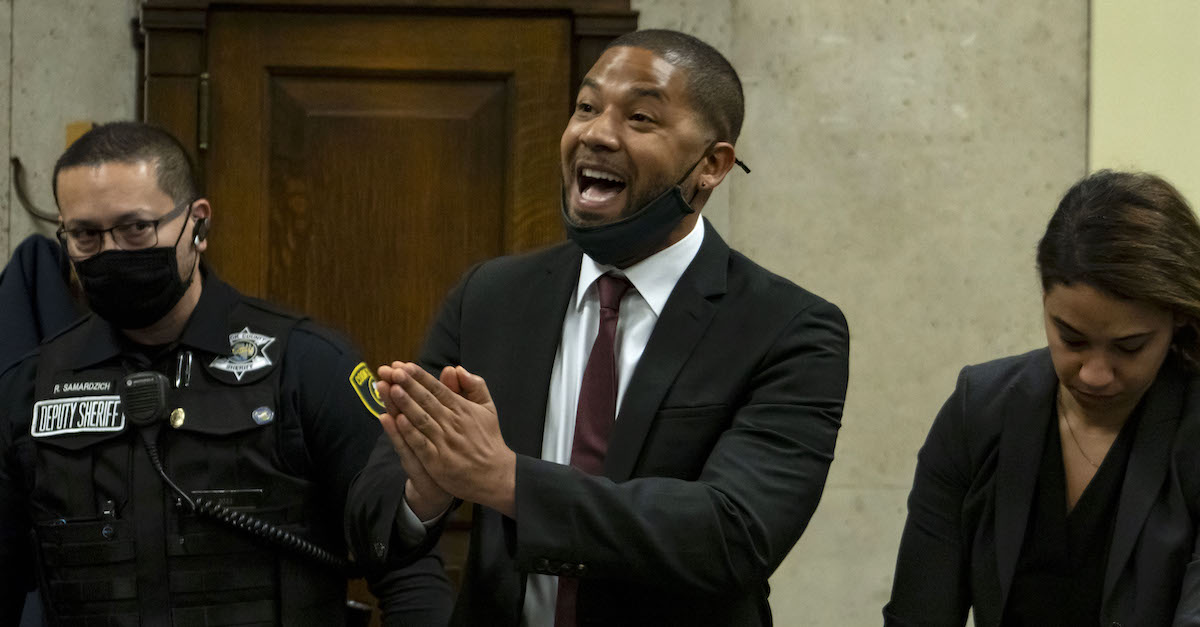
Actor Jussie Smollett speaks to Judge James Linn after his sentence was read on Thursday, March 10, 2022 at the Leighton Criminal Court Building. (Image via Brian Cassella/Pool/Chicago Tribune.)
A Chicago judge has sentenced former “Empire” actor Jussie Smollett to serve 150 days in jail, 30 months on probation, and ordered more than $120,000 in restitution and $25,000 in fines.
Smollett refused to speak prior to his sentencing. His attorney said he advised Smollett not to talk given the complexity of a likely appeal.
But Smollett did angrily address the judge — and the courtroom — after he learned he would be spending time behind bars.
“I am not suicidal,” Smollett said. He then repeated that comment in an increasingly loud tone.
He asserted his innocence moments before he was hauled off to serve his sentence.
“I am not suicidal,” he said again. “I am innocent, and I am not suicidal.”
“If I did this, then it means that I stuck my fist in the fears of Black Americans in this country for over 400 years and the fears of the LGBTQ community,” he said in an increasingly agitated and forceful tone. “Look, your honor, I respect you, and I respect the jury, but I did not do this. And I am not suicidal. And if anything happens to me when I go in there, I did not do it to myself, and you must all know that. I respect you, your honor, and I respect your decision. Jail time? I am not suicidal.”
The judge cut him off to address a few perfunctory procedural matters.
Smollett’s attorneys then asked the judge to stay the sentence. He refused.
“The wheels of justice turn slowly, and sometimes the hammer of justice has to fall,” the judge said. “And it’s falling right here, right now. I’m not staying this. This happens right here, right now.”
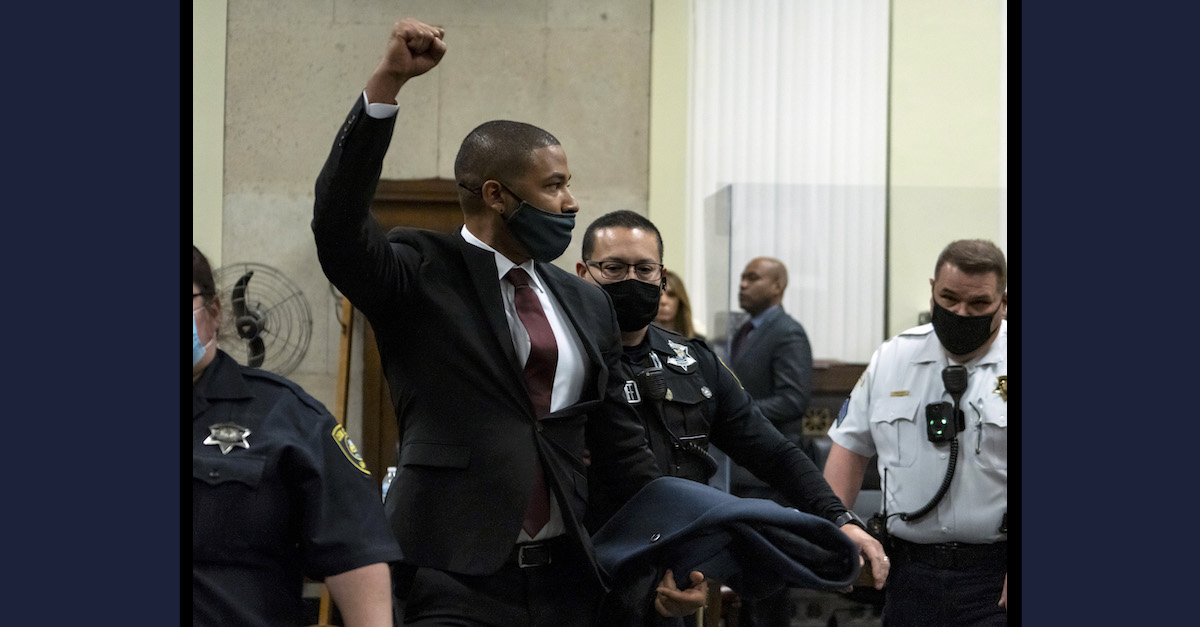
Actor Jussie Smollett is led out of the courtroom after being sentenced to jail time Thursday, March 10, 2022 at the Leighton Criminal Court Building. (Image via Brian Cassella/Pool/Chicago Tribune.)
Smollett held his right fist above his head as two deputies led him out of the courtroom. He appeared to yell something else as he crossed the threshold of the courtroom, but by then, an audio feed of the proceeding had been cut.
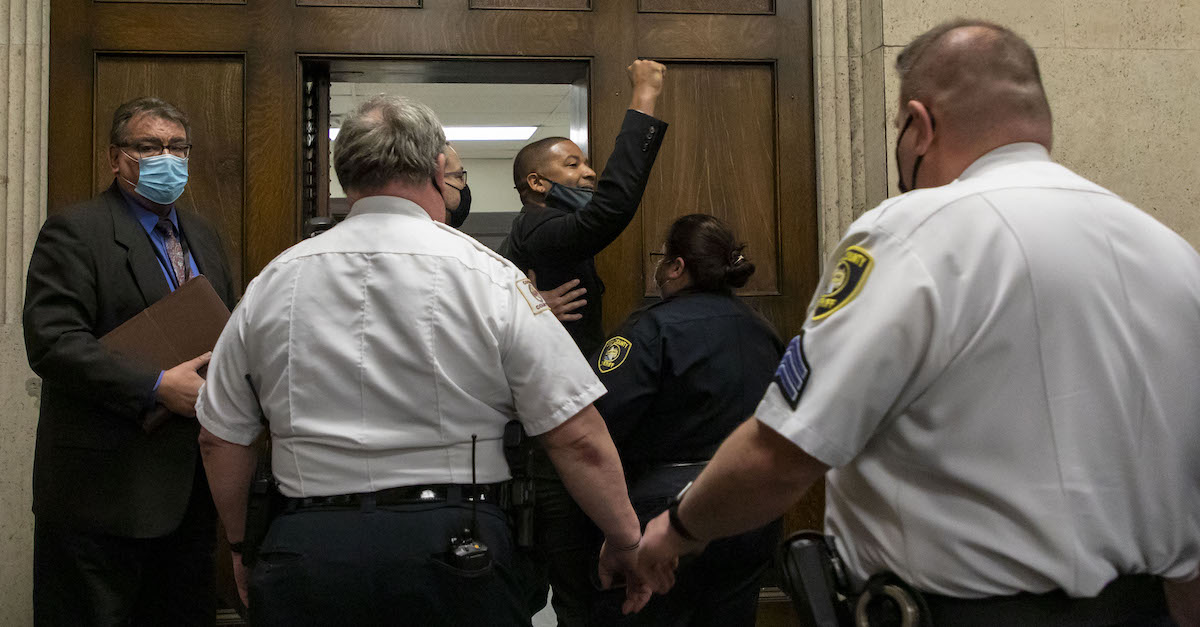
Actor Jussie Smollett appeared to yell back into the courtroom while being led to jail on Thursday, March 10, 2022. (Image via Brian Cassella/Pool/Chicago Tribune.)
The final exchange is cued up in the player below.
A jury last December convicted Smollett, now 39, of staging a fake racist and homophobic attack against himself in January 2019 and of subsequently lying to the police in the aftermath thereof. Smollett, according to prosecutors, concocted the entire affair, which they said involved a makeshift noose, the supposed pouring of bleach, and the purported claim that the attackers yelled, “This is MAGA country.”
The original charges against Smollett were suddenly and surprisingly dropped by State’s Attorney Kimberly M. Foxx under what Smollett’s defense attorneys characterized as a “negotiated” settlement. A special prosecutor reexamined the case pursuant to a request from Sheila O’Brien, a retired appellate court justice who was writing merely as an alleged “interested party,” according to the defense. The special prosecutor subsequently secured an indictment containing six counts of disorderly conduct.
A jury convicted Smollett on the first five of those six charges, but Smollett denied wrongdoing on the witness stand.
The relevant crime — disorderly conduct — is a Class 4 felony with a possible prison sentence of between one and three years under Illinois state law.
Circuit Court Associate Judge James B. Linn said Illinois law gave him very little discretion in sentencing. He said he “fashioned” the sentence for Smollett considering the “crime that was committed and the person who committed it.” He noted that he did not believe he could articulate any foundation under Illinois law to order back-to-back sentences for the counts for which Smollett was convicted.
Regardless, Linn spared few words for Smollett.
“There is nothing that I will do here today that can come close to the damage you’ve already done to your own life,” Linn said. “You’ve turned your life upside down by your misconduct and shenanigans. You’ve destroyed your life as you knew it, and there’s nothing that any sentencing judge could do to you that could compare to the damage you’ve already caused yourself.”
“So, who is Jussie Smollett?” the judge asked rhetorically while noting Smollett had been convicted of “hoaxing” a hate crime. “There are ironies in this case, and the ironies are many, and they are profound.”
Linn said he was talking about Smollett’s testimony itself.
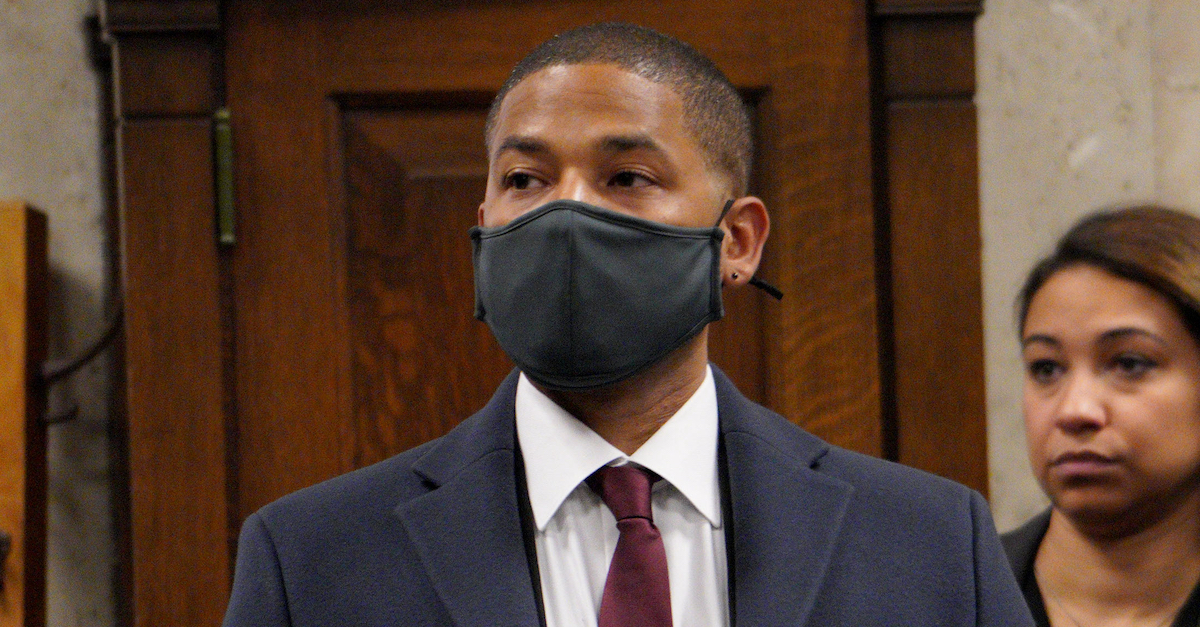
Actor Jussie Smollett appears at his sentencing hearing Thursday, March 10, 2022 at the Leighton Criminal Court Building. (Image via Brian Cassella/Pool/Chicago Tribune.)
The judge noted that the “close-knit” Smollett family cared deeply about “social justice” and that the conviction indicated a degree of “hypocrisy” that “blows his mind.”
Linn said Smollett, who was making $6 million a year, likely didn’t act for money. Rather, the judge said, Smollett “craved” attention and “threw a pity-party for himself.”
Linn said future victims of hate crimes — which he called among the worst crimes society could possibly countenance — may be afraid to come forward for fear they could be branded imposters like Smollett, indeed, was.
The judge also said Smollett “wrote a script” for the crime and exhibited clear evidence of “extreme” premeditation. He said he believed Smollett chose his alleged conspirators because they “idolized” the famous actor.
The judge spent significant time walking through the alleged facts of the offense before handing down the sentence. He noted that Smollett set up patsies as witnesses — such as a friend on the phone — and put the noose around his own neck after his set-up attack occurred and later tightened it to make it look even worse when he first donned the rope.
“You haven’t stopped lying since,” the judge told the defendant. “The problem was you lied to the police.”
Linn called the jury’s verdict “accurate, correct, and wholly corroborated by overwhelming evidence of guilt.” He then scolded Smollett for causing the “national pity-party” that subsequently and predictably ensnared “elected public officials,” “mainstream journalists,” and others.
“There’s a side of you that has this arrogance, selfishness, and narcissism that’s just disgraceful,” the judge continued. Linn used those words several times during a pre-sentence monologue.
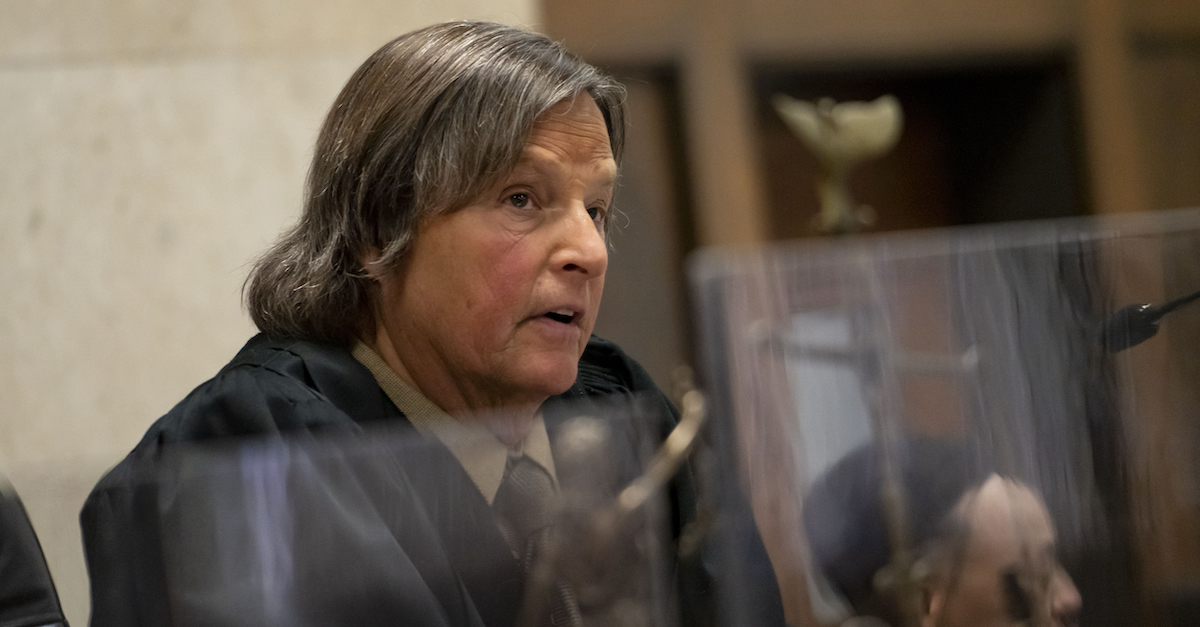
Judge James Linn speaks during a sentencing hearing for actor Jussie Smollett on Thursday, March 10, 2022. (Image via Brian Cassella/Pool/Chicago Tribune.)
Judge Linn said Smollett’s plan squandered precious and limited resources from the “real victims” of “real crimes” to further a nefarious scheme.
“You’re just a charlatan pretending to be a victim of a hate crime, and that’s shameful, especially from the family you got brought up in, with your family values,” Linn continued. “It’s so sad.”
“Your very name has become an adverb for lying,” the judge said to Smollett directly. Linn said people on the streets now refer to similar conduct as “pulling a Jussie.”
“We have some real serious aggravating factors,” the judge said. “Your performance on the witness stand — this can only be described as pure perjury.”
Despite the harsh words, the judge credited those “in the arena” of seeking social justice for coming to Smollett’s aid — and said he was crediting those wishes.
Prior to sentencing, a special prosecutor said Smollett’s proven-beyond-a-reasonable-doubt lies had “a tremendous chilling effect on the real victims” of hate crimes. The state asked for $130,000 to be reimbursed to the City of Chicago — the same amount a civil lawsuit seeks.
But others spoke favorably of the defendant.
Rich Daniels, the musical director for “Empire,” called Smollett a “breakout” star and said the show became “huge” in both the Black community and in “the community at large.”
Daniels said Smollett was a “loving, wonderful young man” who volunteered to appear at Black schools to motivate youth. He called Smollett “charismatic,” “caring,” and “intelligent.”
Another defense witness, Sharon Gelman, said she hoped people would see the “Jussie that I know.” She said she had known Smollett since 1999 and said he was an “utterly beautiful young man” and “pure-hearted.”
Joel Smollett, Jussie’s older brother, read a prepared statement. He said he “strongly believes” in his brother’s “innocence,” but he mostly requested “leniency.”
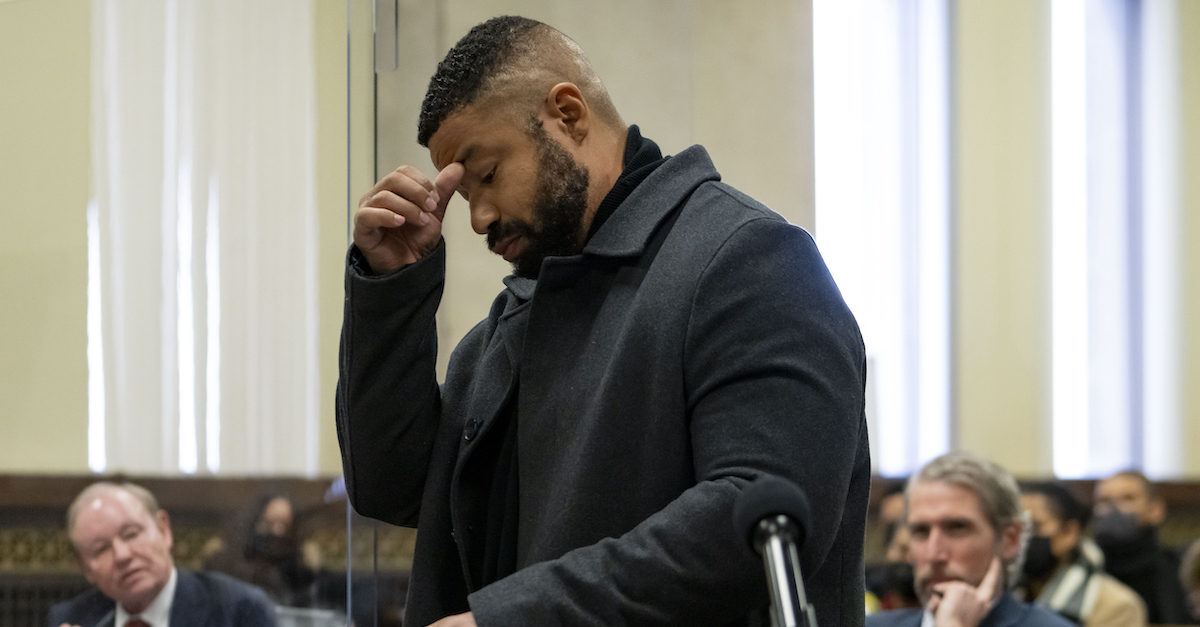
Joel Smollett. (Image via Brian Cassella/Pool/Chicago Tribune.)
“Jussie does not have malice or hatred toward anyone,” Joel Smollett said. “It is truly unfortunate that his reputation has received so many negative connotations, and he has never received the benefit of the doubt or a proper presumption of innocence.”
Joel Smollett added that “public trust” in the judicial system would not be restored by a jail sentence.
Molly Smollett, Jussie’s grandmother, chided the press for — in her view — failing to investigate her grandson’s side of the story and for failing to portray that he was, in her opinion, a “justice warrior.” She added that she wished to go to prison with Smollett if he was so sentenced and complained that the family had “suffered so much” from the prosecution.
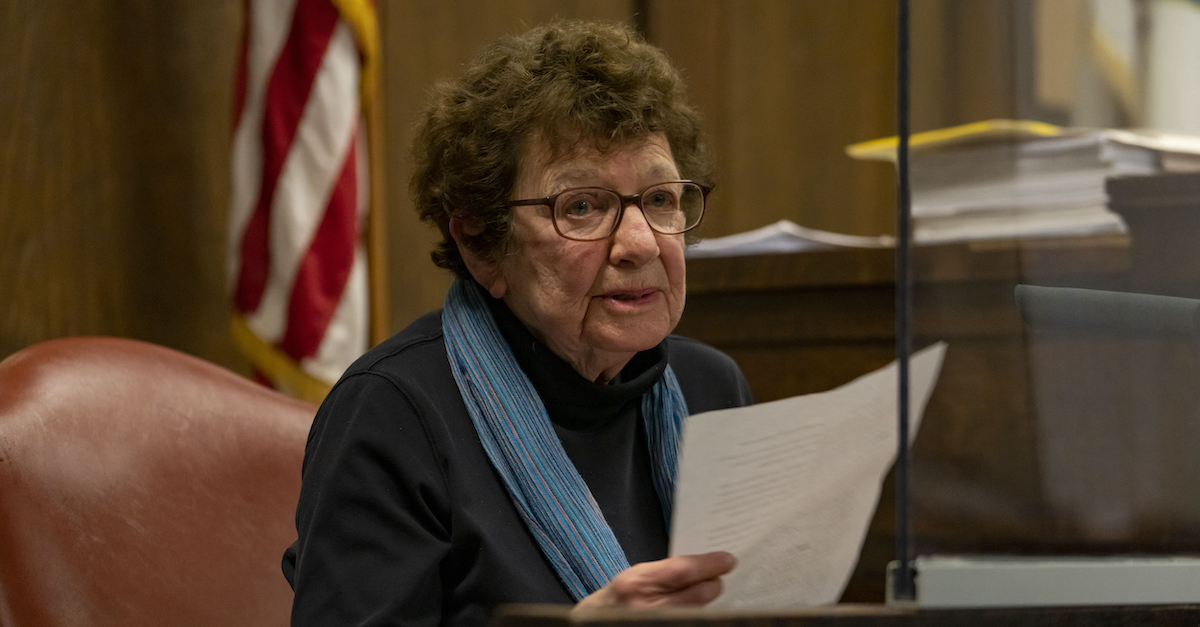
Molly Smollett. Joel Smollett. (Image via Brian Cassella/Pool/Chicago Tribune.)
All of the character witnesses who appeared in person said Smollett should receive community service and no time behind bars.
Smollett cried during some of the words of his relatives.
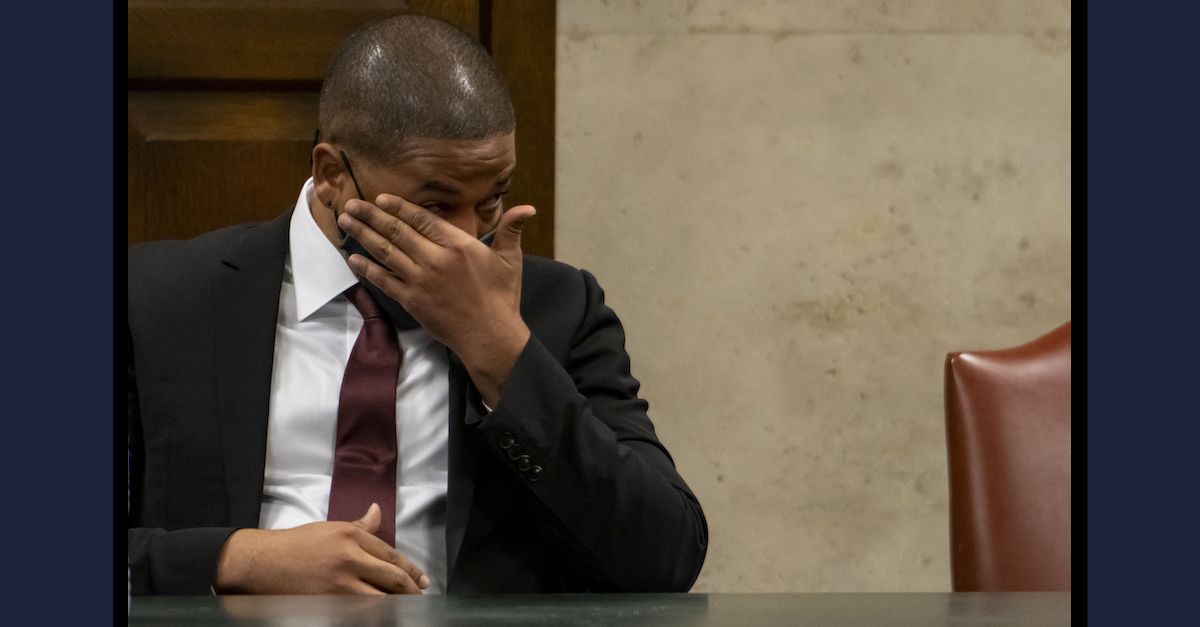
Actor Jussie Smollett tears up while listening to his brother testify at his sentencing hearing Thursday, March 10, 2022. (Image via Brian Cassella/Pool/Chicago Tribune.)
The judge also read a series of letters in favor of Smollett, including one from Black Lives Matter which heralded Smollett’s many donations to causes important to the Black community. Other letters were submitted by the Rev. Jesse Jackson, actor Samuel L. Jackson, the NAACP, and the Illinois Innocence Project.
Special Prosecutor Dan Webb said Smollett engaged in “serious” criminal conduct and that the felony levels of those offenses should not be dismissed.
“During this trial, Mr. Smollett made the choice to sit here in front of a jury,” Webb said. “He decided to beat the case and go in front of a jury and take an oath to tell the truth and decide to lie to them, and lie to them for several hours. It was an effort to obstruct justice in this courtroom.”
Webb noted that the jury fully dismissed Smollett’s version of the events. He said Smollett’s lack of “contrition” after making a “choice to fake a hate crime to benefit himself because he’s Black and gay” needed to be taken into account.
“He actually wanted public attention,” Webb said. “That’s why he reported it to the Chicago Police Department. He’s the one who made that choice.”
Webb said Smollett set up the attack where a police surveillance camera would record it. He also said Smollett spent “hours” lying to Chicago police officers.
The special prosecutor said he “rejected” assertions that Smollett’s offenses were not serious.
“He denigrated, degraded true hate crimes, and he marginalized the people who are true victims of hate crimes,” Webb said. “That is what he did. And he did that knowingly.”
Later, Webb said it was ridiculous for Smollett’s supporters to claim the Chicago Police Department should not have spent as much time investigating the matter as officers did. Webb said the police department took a serious matter seriously and did exactly what Smollett’s supporters should expect in support of member of the Black community reporting an attempted lynching.
Webb also added that Smollett uttered “intentional” lies about being out the night he was allegedly attacked to pick up eggs from an all-night Walgreens. It was not open all night, the special prosecutor countered. Smollett also asserted his attackers were white, the prosecutor noted; they weren’t, he said.
Smollett also refused to submit a DNA sample and refused to allow the police to look at his phone, Webb also noted; the special prosecutor considered that to be evidence of obstruction of justice.
One of Smollett’s attorneys retorted that the authorities were attempting to “crucify” the actor for “a class four lower-level misdemeanor-type felony” and suggested there was an Eighth Amendment issue involving cruel and unusual punishment should prison time attach to the crimes alleged and believed by the jury.
Defense Rubbishes Second Prosecution
Prior to sentencing, one of Smollett’s attorneys complained of at least 13 alleged “errors” which “permeated” the proceeding.
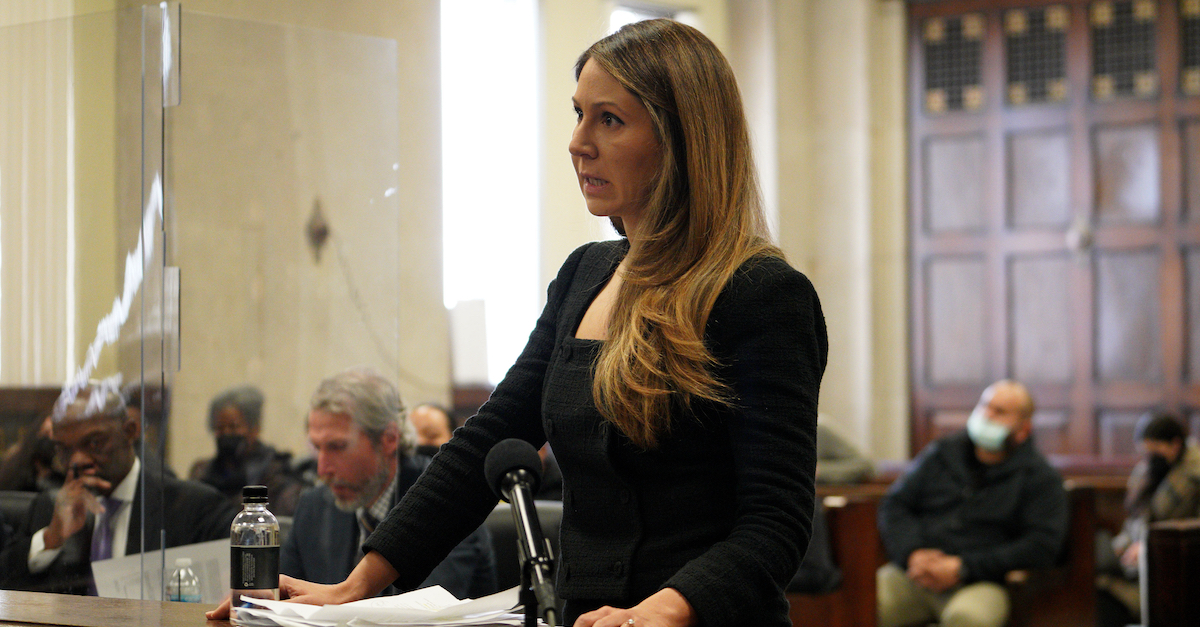
Tina Glandian. (Image via Cassella/Pool/Chicago Tribune.)
Tina Glandian, one of Smollett’s attorneys, on Thursday challenged the authority of the special prosecutor — thus far to no avail. Glandian also argued the judge who oversaw the sentencing proceeding lacked jurisdiction because the judge who appointed the special prosecutor lacked the legal authority to do so. Specifically, the defense said the judge could only appoint a special prosecutor if Foxx formally recused herself; the defense said Foxx did not do so. Therefore, Glandian said the court violated the “separation of powers” and “usurp[ed] the role of the legislature” by “redrafting the statue” which authorizes special prosecutors.
“His due process rights have been violated,” Glandian argued. “He was promised not to be hauled back into court, and that is exactly what happened here.”
“The only punishment” under the original deal with Foxx required Smollett to perform 15 hours of community service and to forfeit a $10,000 bond as restitution, Glandian said while she cited Special Prosecuj
Webb was the one who ultimately secured Smollett’s conviction, and Glandian argued that Webb’s reference to a previous “punishment” by Foxx was proof that the Thursday sentence was a violation of the double jeopardy clause of the U.S. Constitution.
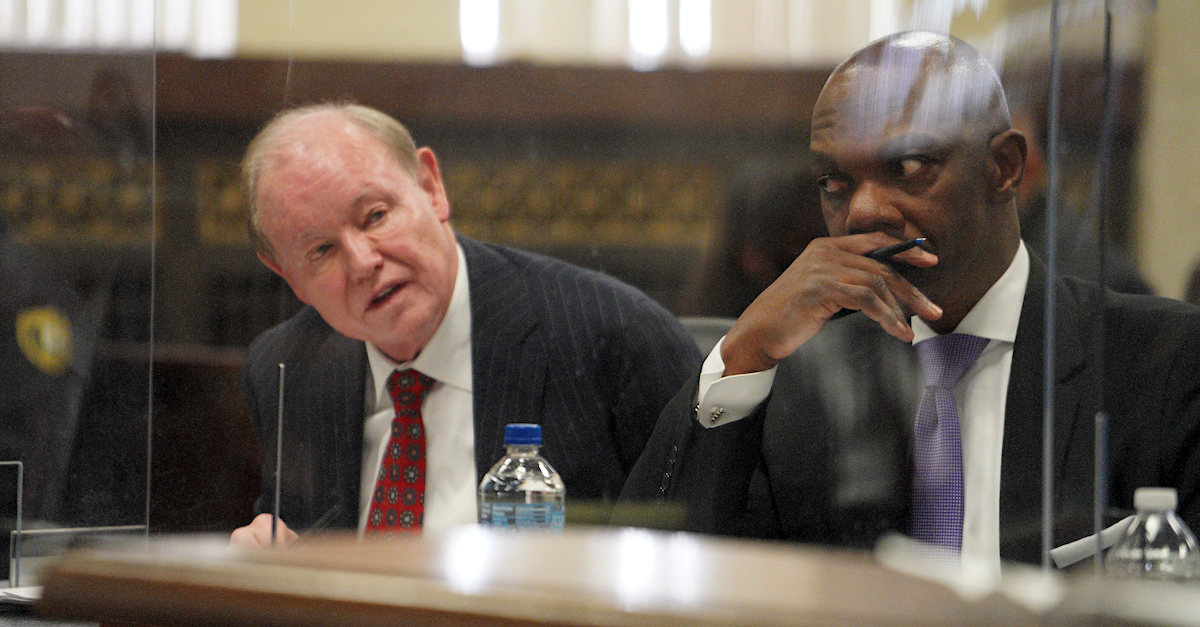
Special prosecutor Dan Webb, left, listens to defense arguments at the sentencing hearing for actor Jussie Smollett on Thursday, March 10, 2022 at the Leighton Criminal Court Building. (Image via Brian Cassella/Pool/Chicago Tribune.)
Glandian also bemoaned “prejudicial pretrial publicity” — including what she called a “national press campaign” by former Chicago Police Superintendent Eddie T. Johnson. Glandian said Johnson’s assertion that Smollett faked the attack because he was “dissatisfied with his salary” was a “completely false assertion” based on “zero evidence.” Glandian further said that DNA and fingerprints resulted in “no connection” between Smollett and a letter Johnson alleged that Smollett had sent to himself.
Later, Glandian complained that the defense wasn’t allowed to properly question the jury venire.
Judge Linn retorted by raising the ridiculousness of some of the proffered defense questions.
“I think I asked most of the questions the defense requested of me,” the judge quizzed. “There were some I did not. For example, you wanted me to ask the venire, ‘what kind of animal would you like to be, if you had to be an animal?’ Or, ‘Superman or Batman, what do you prefer?’ You really think I was supposed to ask a venire when I’m choosing a jury in a criminal case those kinds of questions?”
The defense pivoted by saying there were other relevant questions noted in court papers that were not asked.
Judge Linn said he handled the case the way he did any serious matter — including murder.
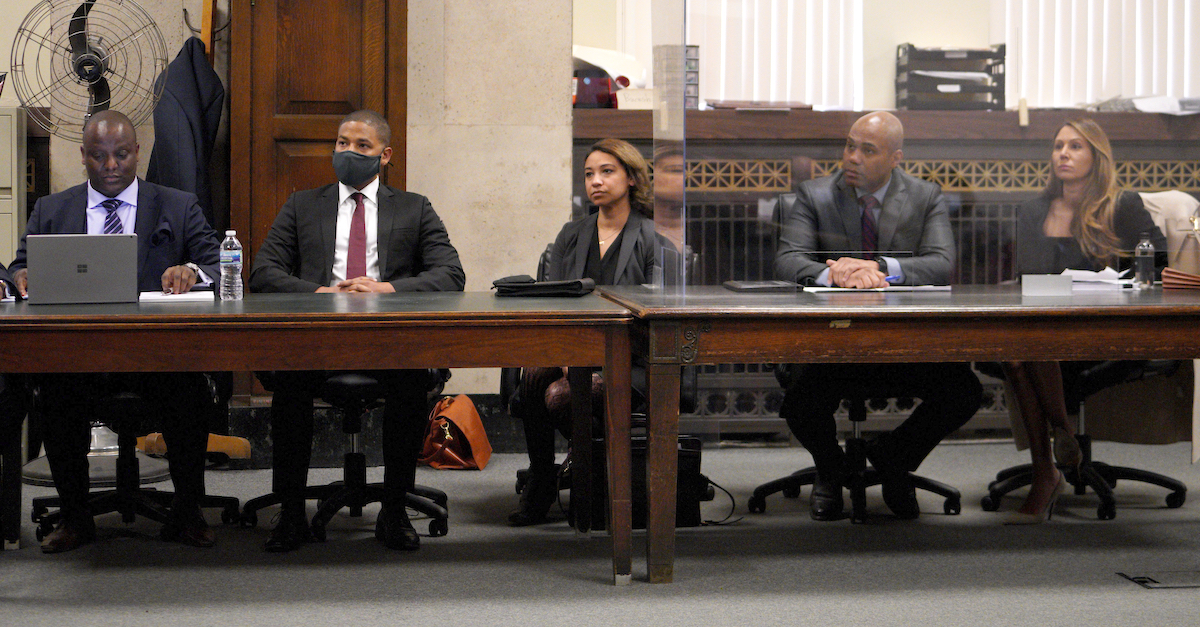
Actor Jussie Smollett (white shirt, maroon tie) is seen with his defense team at a March 10, 2022 sentencing hearing. (Image via Brian Cassella/Pool/Chicago Tribune.)
Glandian said Smollett had been treated more poorly than most murder defendants due to his fame and the hot-button nature of the allegations themselves.
The defense continued by arguing various points of alleged prosecutorial conduct and alleged that the special prosecutor’s office badgered defense witnesses to “take back their statements” or issue new “incriminating statements” that were not part of their “original stories.”
“A new trial is warranted based on all of these errors,” Glandian asserted.
A member of the special prosecutor’s team rebutted that the trial court’s ruling were “proper” and “required by the law.”
“None need be, or should be, revisited,” the special prosecutor said.
He characterized his law firm’s injection into the prosecutorial process as an attempt to “restore the public’s confidence into the integrity of the criminal justice system.”
Webb also said Smollett has blamed “everyone” but himself and his lawyers.
“He’s blamed the prosecutors; he’s blamed your honor, specifically; he’s blamed the courtroom staff. These are in his papers. He’s blamed the Cook County Sheriffs in this courtroom; he’s blamed the entire Cook County judicial system; he’s blamed the Illinois Supreme Court; he’s blamed COVID-19; he’s blamed the media; he’s blamed — quote — “political figures”; he’s blamed witnesses at trial; and he’s even blamed the jury itself. Page after page after page of finger-pointing and scapegoating.”
In other words, according to the special prosecutor’s office, no new trial was necessary.
After more than an hour and a half of such back-and-forth arguments, Judge Linn cautioned that the appointment of a special prosecutor was not a sign that Foxx’s office did anything “terribly untoward or unethical.”
“Public confidence in this entire affair was shaken, and a second look was necessary,” Linn said of the appointment of the special counsel.
Linn also said there was nothing the two brothers who attacked Smollett at his own request could have been found “guilty of” because they consented to participate in the attack itself but didn’t participate in lying to the police. The only issue, Linn noted, was what Smollett “said to the police,” which the jury found to be “patently false.” Smollett’s defense attorneys had said the brothers must have been in on the plot to lie to the police if they were in on the attack, but Linn suggested the evidence didn’t bear out that hypothesis.
Linn said the special counsel’s appointment was valid and that the second indictment against Smollett was similarly sound.
“I do believe that Mr. Smollett received a fair trial,” Linn said. He refused to grant a new trial and said he hoped his elucidated analysis would put the complaints “to rest.”
The Trial
“There was no hoax,” Smollett testified during the trial, according to the Associated Press. Rather, Smollett indicated “he was the victim of a real hate crime,” the AP reported.
Smollett further asserted that two fellow actors, the brothers Abel Osundairo and Ola Osundairo, were “liars” for suggesting that a $3,500 check Smollett issued to them was a payout for faking the incident. Smollett testified that the money changed hands for a workout plan and a meal plan that the brothers crafted for him.
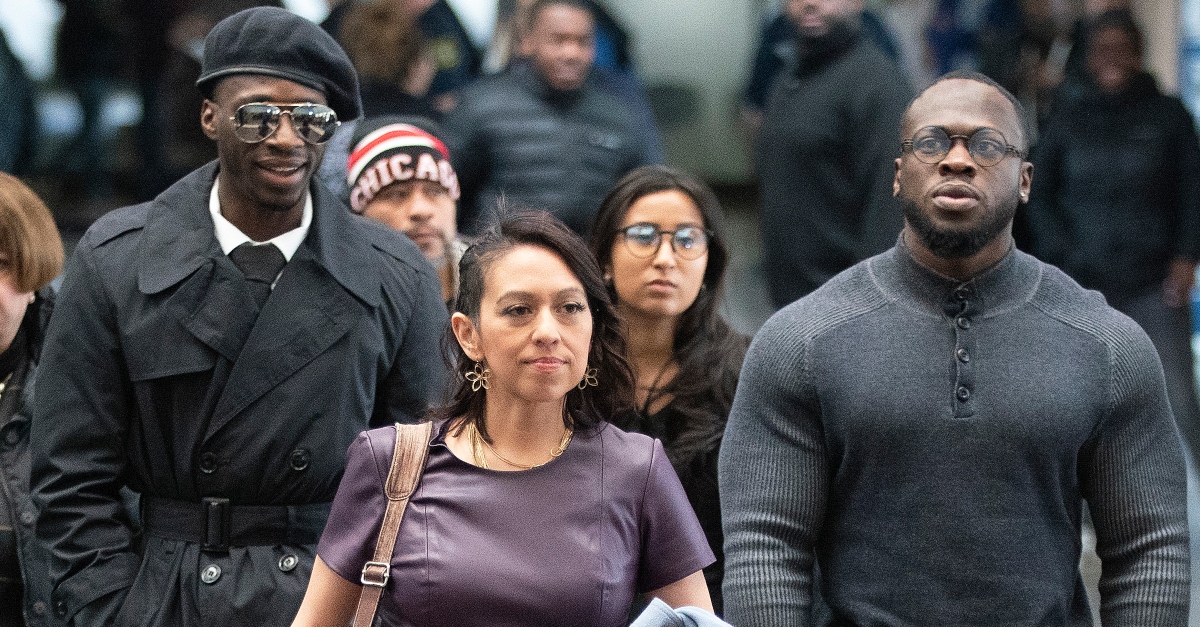
Attorney Gloria Schmidt Rodriguez appears in a file photo with Abimbola and Ola Osundairo. (Image via Nuccio DiNuzzo/Getty Images.)
On Thursday, Glandian, of Smollett’s defense team, sought to rubbish notions that the check was anything nefarious. Glandian also argued that the Osundairo brothers “conveniently” claimed to know of the entire alleged plot except for the involvement of the police and indicated that both should have been charged with conspiring to file a false police report.
At trial, however, the Osundairos testified that Smollett asked them to participate in the hoax near the actor’s home.
Smollett’s attorneys said the brothers attacked Smollett because he is gay and Black. Both of the brothers are also Black. Smollett’s attorneys also claimed the Osundairos tried to shake Smollett out of $1 million if they promised not to testify for the state.
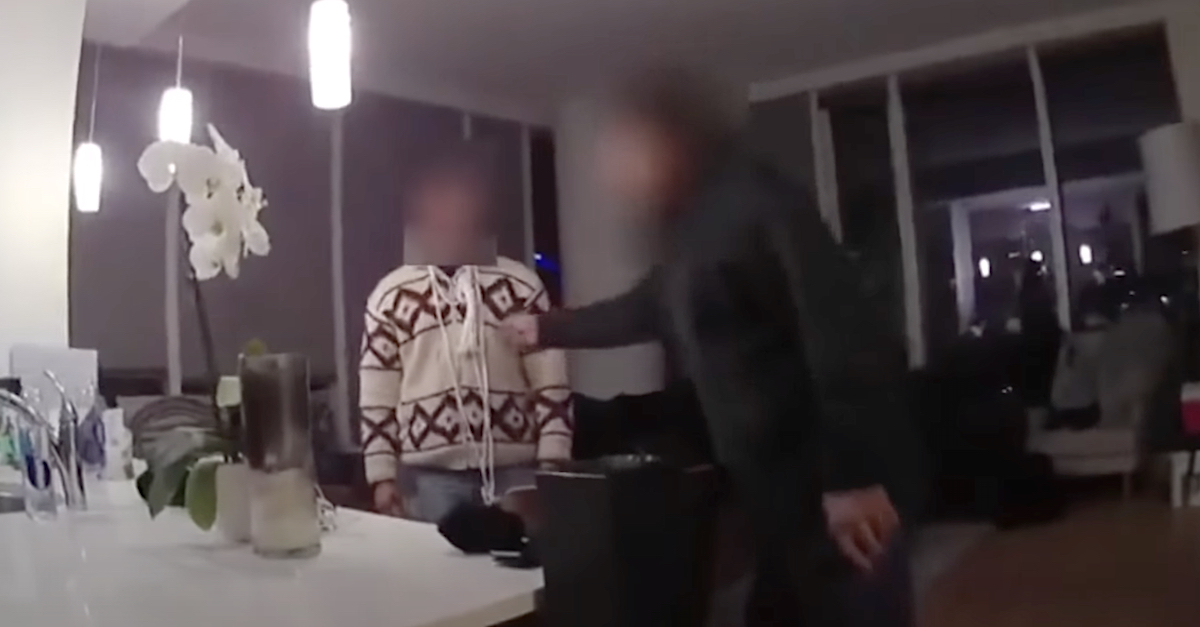
A still frame taken from a Chicago Police Department body camera video shows an officer examining the noose Jussie Smollett claimed two attackers placed around his neck. (Image via screengrab.)
Prosecutors said Smollett faked the affair because he wanted to create favorable and sympathetic publicity for himself.
After the guilty verdict, Special Prosecutor Webb said Smollett “lie[d] for hours and hours and hours” on the witness stand. Webb said the testimony “compounded” the actor’s “misconduct.”
[Editor’s note: this piece has been updated with additional photos and details from the proceeding.]
[images as noted]
Have a tip we should know? [email protected]